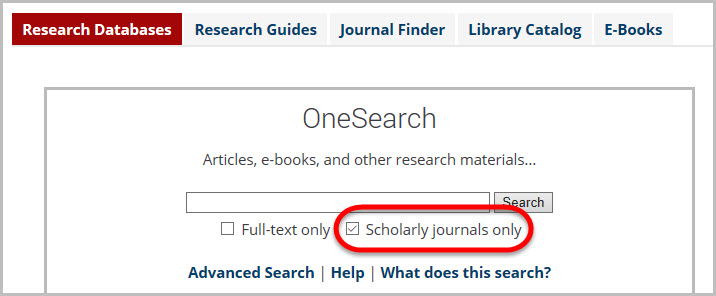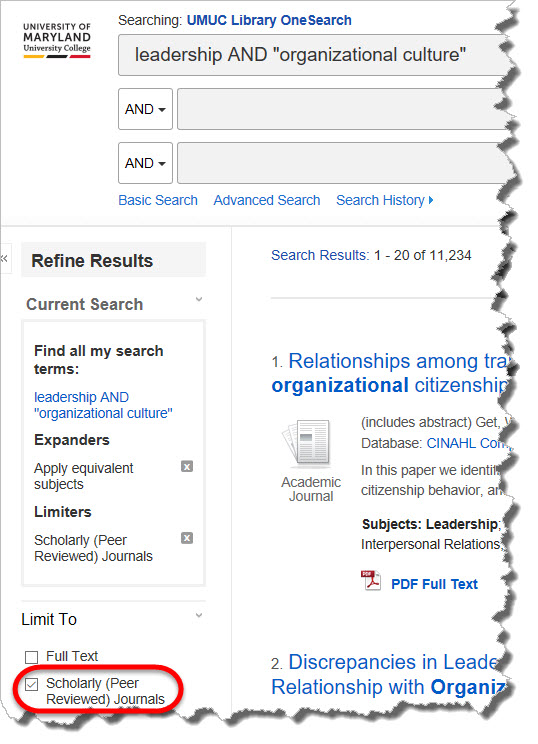Scroll down the page or use the links provided below to learn about scholarly and peer-reviewed articles.
Peer-reviewed literature is a subset of scholarly literature; the peer-reviewed label is used for articles that have been carefully reviewed prior to publication by other experts in the research area that's covered by the article; these other experts are considered to be the peers of the article's author(s). Articles that are peer-reviewed are also commonly referred to as refereed.
There are different methods by which the peer-review process may occur. In double-blind reviews, for example, articles are sent to two or more external reviewers for feedback, and the identities of the author(s) and reviewers are not made known to one another. In single-blind reviews, reviewers are aware of who wrote the article being reviewed, but the names of the reviewers are not provided to the article's author(s).
Peer reviewers may recommend that an article be published as is, they may require the author(s) to make certain corrections or clarify certain points before the article can be published, or they may recommend that an article be rejected for publication.
The peer-review process is intended to help ensure that published articles reflect solid scholarship, and for this reason, peer review has generally become an accepted indicator of research quality. (See, for example, What is peer review?", posted by Wiley, a publisher of journals and books. But there's also been criticism of peer review; see, for example, "Peer review: A flawed process at the heart of science and journals", published in the Journal of the Royal Society of Medicine.)
The term peer-reviewed is applied almost exclusively to journal articles, as other types of documents are usually just reviewed by editors or fact checkers prior to publication. Editors and fact checkers may not have expertise in the topic covered by an article, so their review is generally not as thorough as that provided by peer reviewers.
Does "scholarly" mean the same thing as "peer-reviewed"?
The terms peer-reviewed/refereed and scholarly/academic are not quite synonymous, but these terms are often used interchangeably because most articles that are considered to be scholarly have undergone the peer-review process.
There are, however, some academic journals that have attained a reputation for quality that allows them to use editorial reviewers rather than peer reviewers. Reviews in American History is an example of one such publication.
Additionally, there are a handful of other publications that are classified as trade publications rather than scholarly/academic publications but that are widely accepted as authoritative research sources, due in part to the reputation of their publishers. Examples include the Harvard Business Review and the Chronicle of Higher Education.
Return to topThe image below, for example, shows the selection of the Scholarly journals only limiter for the OneSearch search box on the Library's home page.

And the next image shows the selection of the Scholarly (Peer Reviewed) Journals limiter on the OneSearch search results page.

You will get the same results regardless of whether you select the limiter before or after you run a search.
Return to topYou can determine whether a particular article is scholarly/peer-reviewed by looking for the following characteristics, since scholarly/peer-reviewed articles possess most or all of the qualities listed below:
Using Ulrichsweb to find journal information
You can also use the Ulrichsweb Global Serials Directory database to look up a particular journal and see whether it's classified as being scholarly/academic and/or refereed/peer-reviewed, in which case an article from that journal is likely to have undergone the peer-review process. (Note, though, that not all content that appears in a peer-reviewed publication is necessarily peer-reviewed. Peer-reviewed journals may contain book reviews, letters to the editor, and other articles that have not undergone peer review.)
Instructions can be found at Using Ulrichsweb Global Serials Directory to Find Journal Information.
Using a journal's website to find information
You can also use Google, Bing, etc. to find a journal's website. Once you've done that, look for pages that give information about the journal and/or that provide instructions for potential authors, since this may help you determine whether the journal uses the peer-review process.
If you have any questions about this information, please use the UMGC Library's Ask a Librarian service to receive assistance.